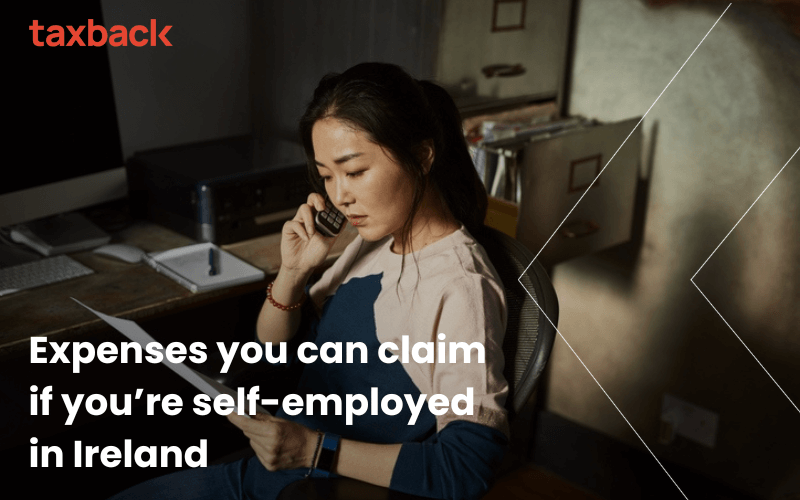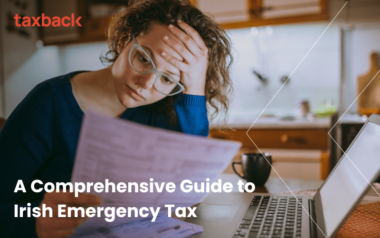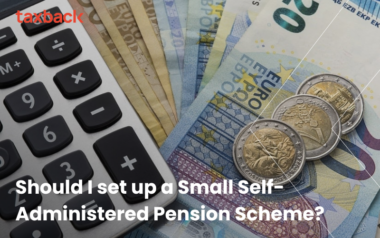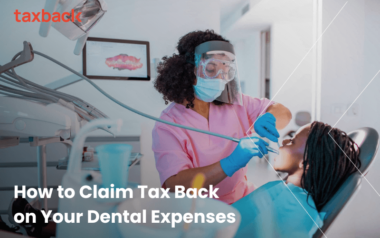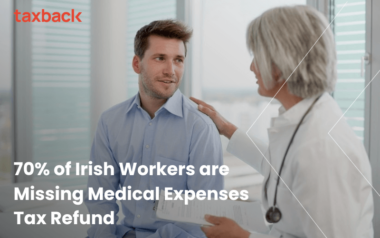Claiming expenses is often a topic for debate as there can be some confusion on what expenses are allowable for tax purposes. The first step towards claiming allowable business expenses is to keep a detailed track of them.
If you’re self-employed in Ireland, then you’re obliged to file a self-assessed tax return, usually by the deadline of October 31 or by the mid-November pay and file deadline.
Your tax return is used to declare the income you earn and also to claim any tax allowances that can be offset against your tax bill.
In this blog, we’ll discuss what expenses you can claim with your tax rebate if you are self-employed.
Do I need to file a tax return if I’m self-employed?
Most self-employed workers will need to file a tax return.
Find out how to claim tax back.
In fact, you’ll need to file a tax return if any of the following apply to you:
- You’re self-employed
- You’re a contractor or sub-contractor
- You’re a landlord or host Airbnb in Ireland
- You’re a non-resident landlord
- You receive income in addition to PAYE, e.g. investment portfolio, rental income, income from a construction trade, capital gains, consulting, contracting or if you receive any other untaxed income from ‘nixers’ or work you do in addition to your normal PAYE job
- You’re a director of a company
- You belong to an employee share scheme
Fortunately, filing a tax return with an expert like Taxback is easy!
We take the hassle out of filing your Irish tax return
Tracking Your Expenses
What records to keep
A good way of monitoring the different expenses in your business is to keep a record of them by using the following methods and aids (anything to do with business):
- Cashbooks
- Invoices
- Mileage records
- Bank statements
- Receipts for purchases
- CIS vouchers
How to keep your records
Either on paper or on computer. For electronic records, you must:
- capture all the information (front and back)
- save information in a readable format
- keep a back-up
How long to keep records
As a general rule for a minimum of six years.
Allowable Expenses
In order for an expense to be regarded as “allowable” for tax purposes, it must be directly related to the running of the business. Items such as mobile phones and cars can cause doubt as often people will hold these for their own personal use also.
Only the usage which is directly related to the running of the business can be claimed.
You can claim for the cost of the day-to-day running of your business to include items such as:
- Purchase of goods for resale
- Wages, rent, rates, repairs, lighting and heating etc.
- Running costs of vehicles or machinery used in the business
- Accountancy fees
- Interest paid on any monies borrowed to finance business expenses/items
- Lease payments on vehicles or machinery used in the business
Equipment
This is an allowable expense. Any equipment used specifically in relation to the running of the business may be reclaimable.
Details of the usage and an explanation for its purchase will be required. In the case of an asset such as computers, a thorough examination will be conducted to ensure that it is being used solely for business purposes.
Generally, capital allowances (tax deductions spread over a number of years) are claimed on the acquisition of equipment, as this is treated as a capital expenditure for tax purposes.
We take the hassle out of filing your Irish tax return
Motoring Expenses
If you own a car that is used for both business and personal purposes, you are entitled to claim back a percentage of the actual running costs e.g. fuel, repairs, servicing etc, which relates to the business use.
The full amount of the business-related expenses can be claimed against the self-employed income but the individual is required to keep the receipts for the expenses incurred.
Commuting expenses
i.e. travel from home to work cannot be reclaimed. However, if you travel from one place of work to another location where work is also being carried out temporarily, a portion of this tax may be claimed back.
Disallowed Expenses
There are certain expenses that cannot be reclaimed:
Personal mileage expenses
Mileage that is not directly related to business is not claimable
Food expenses
Food is a living expense. It is a basic need and is not related to business operations. In the case of an employee on a business trip whereby they are forced to eat out or incur food costs that would not be normal, an allowance may be given to cover these costs
Clothing costs
Normal clothing even clothes worn to work are not reclaimable expenses
Accommodation
The cost of accommodation is not allowable. Like food, shelter is a basic need.
Client entertainment
Although this may be a business expense, it is not an allowable deduction for tax purposes.
Where an individual incurs genuine business expenses on networking/client entertainment, in most circumstances that individual can be reimbursed on a tax-free basis by their employer, once the expenses are fully vouched and reasonable (strict Revenue guidelines must be adhered to).
However, the company or business will not be entitled to claim a tax deduction in respect of such reimbursements.
Staff entertainment
Staff entertainment expenses are deductible as long as they are reasonable.
The above guidelines provide a comprehensive overview of the expenses that are claimable/non-claimable.
However, sometimes it may not always be clear-cut. Taxback has a team of Tax Advisors who would be happy to help you – if you would like more assistance please do not hesitate to contact us.
We take the hassle out of filing your Irish tax return
Tax Facts
The Irish tax year is Jan 1- Dec 31.
The deadline for submission of a self-assessed tax return is 31 October following the end of the tax year in question.
The extended deadline for people who pay and file online is usually around 15 November i.e. just over 2 weeks after the paper filing deadline.
Some PAYE workers also have to file an Irish tax return.
Get started with your self-assessed tax return here
Last Updated on April 2, 2024

